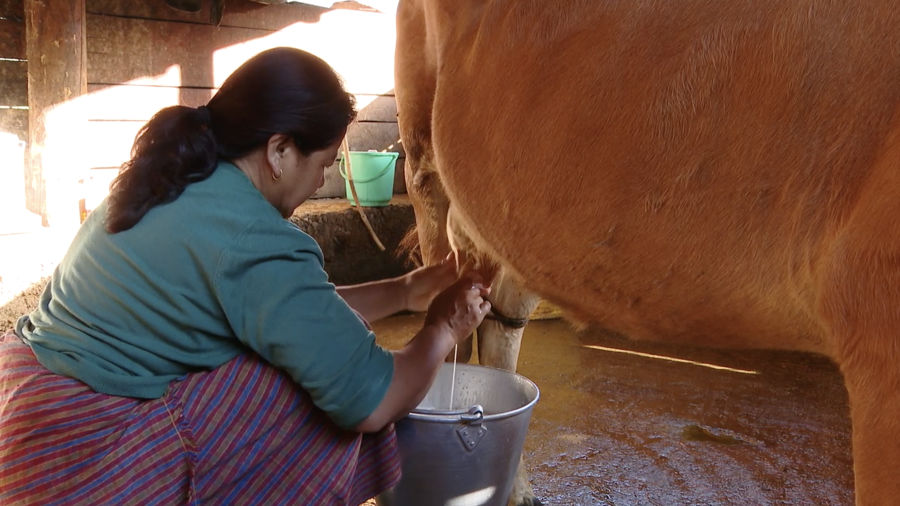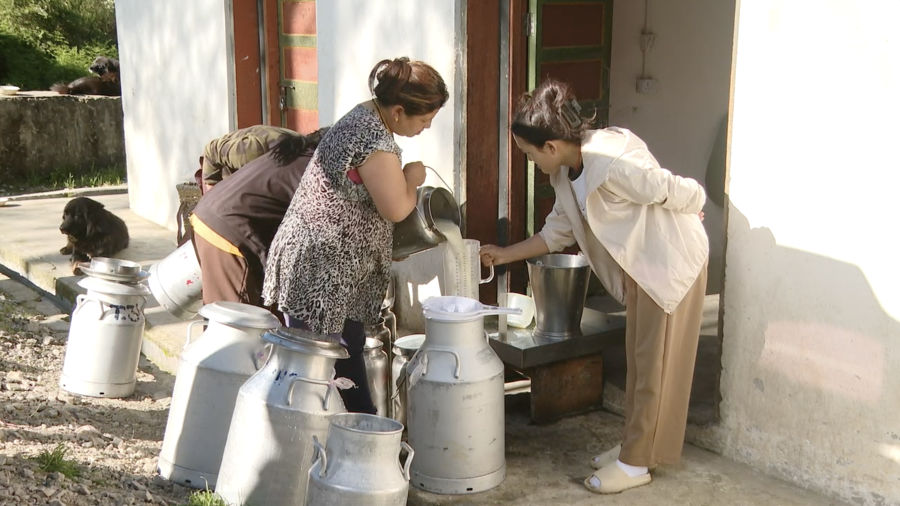
For the women of Tshaluna in Thimphu’s Maedwang Gewog, livestock rearing has not just been a routine, it has become a livelihood. Powered by a dairy co-operative that has grown from 19 to 32 households since its inception in 2009, these women are now earning a steady income, repaying loans, and even saving for their children’s future, all through selling milk.
The day at Tshaluna village begins early.
Every morning, Tshering Om, a 46-year-old, begins her day at around 6.
She begins her daily chores by getting the cattle feed set on the stove. Then she washes her cows. After that, she starts milking her jersey cows.
With milking done, she heads over to her poultry farm to release the chickens from the coop and feed them.
From the sale of the milk and eggs to the co-operative, she earns around Nu 40,000 monthly.
Tshering’s daughter, Sonam Deki, who holds a Diploma in Food Technology and Catering, takes the milk to the co-operative.
Sonam also helps in marketing of the dairy products at the co-operative’s outlet in town.
For Tshering, every effort she and her daughter put in for the family is worth it.
“Our livelihoods depend on livestock rearing and agricultural works and we got used to waking up every day at this time, so we don’t falter.”
The chickens and cows owned by the family were purchased with a loan from BDBL. She said the loan is being repaid jointly through the income she earns from the farm and her husband’s earnings, besides covering the family’s daily expenses.
“Aside from the money that I earn from selling milk and my husband’s salary, whatever we earn by doing our own works is kept in a joint account. We spend that for our children and also run the family. We are also able to pay back the loan to BDBL. So, selling milk benefits us a lot.”
And the story is the same for other women in the village. Dairy farming has become their mainstay.

The co-operative, supported by Thimphu District Administration with around 30 members and 7 workers, all consisting of women made around Nu 8 M last year alone.
Yeshi Dem, a member of Tshaluna Dairy Co-operative said “We earn around Nu 50,000 to 60,000 and sometimes 40,000 to 50,000 depending on the amount of milk we supply. This benefits us a lot because we can manage the loans we have and pay off our debts. Additionally, we can buy all the groceries for the family.”
Ugyen Dem, another member said “Selling milk is very much beneficial. If we don’t, there are no other ways of income. Selling the milk gives us enough to make ends meet. We have nothing else than the cattle. We can also deposit at least Nu 500 in our children’s account monthly.”
Likewise, Phub Dem said “If we sell the milk to the co-operative, we get paid monthly, just like civil servants. At the end of the month we get paid fairly. That, we deposit some in our children’s account and some we keep for the family. We can also buy groceries. In a month, we get a minimum of Nu 15,000 by selling milk.”
Before the milk is taken to the market, the co-operative tests its purity. If found adulterated, people are fined in accordance with the bylaws.
The co-operative was established in 2009 and has seen development over the years.
Pratiman Rai, Livestock Officer, Tshaluna Dairy Co-operative said “From the 19 households initially, milk production was only 60 litres per day. But now, households taking up milk production rose to 32. And they produce over 490 to 510 litres of milk daily.”
To expand the co-operative to a modern-tech farm, funds are being sought.
Sangay Tshering, chairman of the co-operative, said “With the aim to make the co-operative independent, we are working on that. There are many who are working with me and they have shown strong interest. Even when it comes to the quality of milk, we are maintaining high standards.”
The outlet in Thimphu town sells fresh milk, cheese, curd, and butter.
And from farm to town, the dairy products of Tshaluna Dairy Co-operative are selling like hot cakes. With plans to upgrade the facility, the women of Tshaluna are set to transform not just their lives but the future of dairy farming in the country.
Kelzang Chhophyel
Edited by Kipchu









